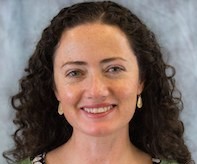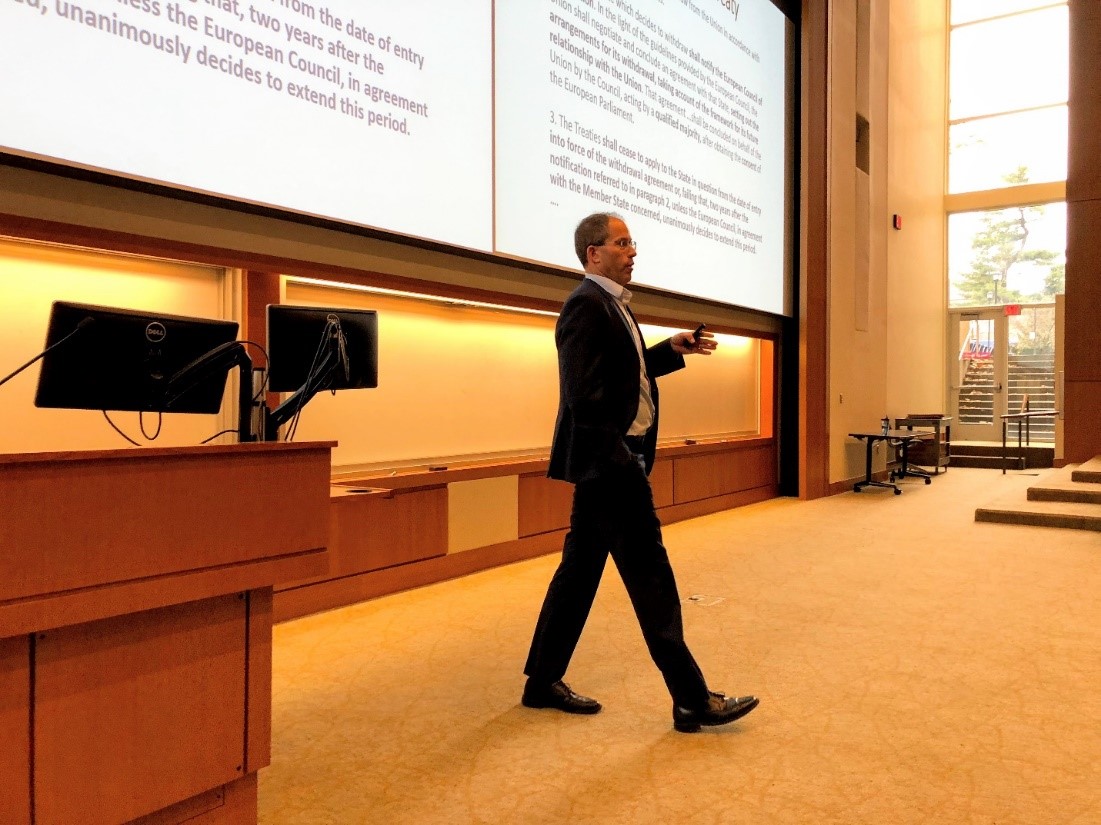Prior Speakers
 Lee Epstein
Lee Epstein
December 2019
Lee Epstein delivered a talk entitled “Automated Linguistic Analysis to Assess Cognitive Decline on the Bench." Dr. Epstein is a Professor of Political Science at Washington University in St. Louis.
 Ashley Jardina
Ashley Jardina
November 2019
Ashley Jardina presented her book entitled White Identity Politics. Dr. Jardina is an Assistant Professor of Political Science at Duke University.
 Frederick Boehmke
Frederick Boehmke
Fred Boehmke presented a two-day workshop on duration models and hazard analysis. Dr. Boehmke is a Professor of Political Science at the University of Iowa.
 Amber Boydstun
Amber Boydstun
Amber Boydstun presented, "Media Agenda-Setting using Text-Analysis." Dr. Boydstun is an Associate Professor of Political Science at the University of California Davis.
 Matthew Gabel
Matthew Gabel
Washington University’s Matthew Gabel presented, "Breaking Up Is Hard to Do: The UK and the European Union." Dr. Gabel is the author of two books on the European Union: Interests and Integration: Market Liberalization, Public Opinion, and European Union; and International Courts and the Performance of International Agreements with Clifford Carruba.
 John Sides
John Sides
John Sides presented a talk entitled, "Donald Trump and the Rise of White Identity Politics." Dr. Sides was Professor of Political Science at George Washington University (now at Vanderbilt). He studies political behavior in American and comparative politics. He is an author of several books, including Identity Crisis: The 2016 Presidential Campaign and The Battle for the Meaning of America. He helped found and serves as editor-in-chief of The Monkey Cage, a site about political science and politics at the Washington Post.
 John Poe
John Poe
John Poe, UK Political Science PhD, presented a 3-day introductory workshop on Bayesian analysis and multilevel modeling in Stata. Dr. Poe is currently Statistician Lead at University of Michigan Medical School and teaches at the ICPSR.
.
 Mark Hetherington
Mark Hetherington
Mark Hetherington presented a talk on his latest book, Prius or Pickup?: How the Answers to Four Simple Questions Explain America's Great Divide, which takes a new look at polarization in the United States. Dr. Hetherington is a Professor of Political Science at the University of North Carolina, Chapel Hill, where he is the Raymond Dawson Distinguished Bicentennial Professor of Political Science, studying the American electorate.
 Jennifer Merolla
Jennifer Merolla
Jennifer Merolla discussed her book, Framing Immigrants: News Coverage, Public Opinion, and Policy. The talk focused on media coverage of immigration and subsequent public opinion. Dr. Merolla is a Professor of Political Science at the University of California, Riverside, specializing in public opinion on immigration policy, terrorism and other topics. She is the coauthor of Democracy at Risk: How Terrorist Threats Affect the Public.
 Maya Sen
Maya Sen
Maya Sen presented a talk entitled, “The Political Legacy of Southern Slavery,” based on her co-authored book, Deep Roots: How Slavery Still Shapes Southern Politics. Dr. Sen is an an Associate Professor of Political Science at Harvard University's John F. Kennedy School of Government whose research interests include law, political economy, race and ethnic politics, and statistical methods.
 Michael Colaresi
Michael Colaresi
Michael Colaresi presented his research on “The Ups and Downs of Human Rights: Using Aspect-based Sentiment Analysis and Document Meta Data to Explore Information Effects in Human Rights Reports,” sharing a new method for tracking human rights violations through use of advanced methods of text analysis. Dr. Colaresi is the William S. Dietrich II Chair of Political Science at the University of Pittsburgh whose work focuses on the use of various computational tools to improve modeling of national security, international and interstate violence, and human rights research.
 Jessica Weeks
Jessica Weeks
Jessica Weeks presented a talk entitled, “How and why does public opinion affect foreign policy in democracies?” Dr. Weeks is an Associate Professor and Trice Family Faculty Scholar at the University of Wisconsin, Madison. In addition to her research on public opinion of foreign policy, Dr. Weeks also researches the domestic politics of foreign policy, the domestic and international politics of authoritarian regimes.
 Kathleen Searles
Kathleen Searles
Kathleen Searles presented research entitled, “Left to Our Own Devices: Political News Attention and Engagement in a Mobile Era” published in the Journal of Computer-Mediated Communication. Dr. Searles also led a panel on media coverage of the 2016 election called, “Don’t Hate the Media; Hate the Game.” Dr. Searles is Assistant Professor of Political Communication in the Manship School of Mass Communication and the Department of Political Science at Louisiana State University. Her interests include news media, campaign advertising, and political psychology.
 Jon Krosnick
Jon Krosnick
Jon Krosnick presented two talks, the first entitled, “Social Psychology Under the Microscope: Do Our Classic Experiments Replicate When Participants Are Representative of the General Public Rather Than Convenience Samples of College Students?” The research suggests that the current trend in social science laboratory studies are not generally representative of the public as a whole. The second talk, “Political Thinking, Passion and Action in America: The Contributions of Jon Krosnick to the Study of Political Psychology” discussed Dr. Kronick’s 30-year career in political science and social psychology. Dr. Krosnick is is Frederic O. Glover Professor in Humanities and Social Sciences at Stanford University.
 Richard York
Richard York
Richard York provided a methods presentation called, “Multicollinearlity & Residualization: When the Cure is Worse than the Disease!” Dr. York is a Professor of Sociology and Environmental Studies whose research includes work on the structural characteristics of societies and the sociology, philosophy, and history of science.
 Sara McLaughlin Mitchell
Sara McLaughlin Mitchell
Sarah McLaughlin Mitchell provided an introductory workshop on time series analysis. Dr. Mitchell is a Professor of Political Science at the University of Iowa and a renowned political methodologist and expert on International Relations who is also Co-Director of the Issue Correlates of War Project. She has taught Time-Series Analysis both at Iowa and at the ICPSR Summer Program at the University of Michigan numerous times.
 Arnold Stromberg, Abby Córdova, Dominique Zéphyr, Mark Peffley
Arnold Stromberg, Abby Córdova, Dominique Zéphyr, Mark Peffley
Arnold Stromberg, Abby Córdova, Dominique Zéphyr, and Mark Peffley of the University of Kentucky collectively presented a methods workshop on Applied Survey Data Analysis. Dr. Stromberg is Professor and Chair of the Department of Statistics. Dr. Córdova is an Associate Professor of Political Science specializing in comparative politics. Dr. Peffley is a Professor of Political Science and Director of the Quantitative Initiative for Policy and Social Research.
 Kevin Arceneaux
Kevin Arceneaux
Kevin Arceneaux presented a workshop, "Does Loss Aversion Motivate Collective Action? A Field Experiment," to introduce social scientists to a design that applies experimental methods to a natural setting. Dr. Arceneaux is the Thomas J. Freaney, Jr. Professor of Political Science, Faculty Affiliate with the Institute for Public Affairs, and Director of the Behavioral Foundations Lab at Temple University and has published several articles in political psychology, attitude formation and experimental methods.
 Michelle Taylor-Robinson
Michelle Taylor-Robinson
Michelle Taylor-Robinson presented a talk entitled, “Gender Inequality and Integration in the U.S. and Latin America: Developing a Level Playing Field for Political Appointees?” Dr. Taylor-Robinson’s research focuses on democratic institutional design and political representation. Dr. Taylor Robinson is Professor of Political Science and affiliated faculty with the Women’s and Gender Studies Program at Texas A&M University.
 James Gibson
James Gibson
James Gibson presented results from his book Electing Judges: The Surprising Effects of Campaigning on Judicial Legitimacy in which he discussed counterintuitive evidence about the role of judicial elections in the maintenance of judicial legitimacy. Dr. Gibson is the Sidney W. Souers Professor of Government at Washington University in St. Louis whose research focuses on judicial politics, political tolerance and South African politics.
 Bernice Pescosolido
Bernice Pescosolido
Bernice Pescosolido presented two research talks on mental illness: “Integrating Theoretical, Methodological, & Policy Concerns in the Research Agenda on the Stigma of Mental Illness” and “Connecting Complexities: Examining Issues in Health, Illness, and Health Care Through Networks,” with the latter being co-sponsored by the LINKS Center for Social Network Analysis. Dr. Pescosolido is Distinguished Professor of Sociology at Indiana University and Director of the Indiana Consortium for Mental Health Services Research.
 Gary King
Gary King
Gary King presented two methods workshops on “Computer-Assisted Clustering and Conceptualization from Unstructured Text” and “Matching Methods for Causal Inference,” respectively. Dr. King also shared some of his research in a presentation entitled, “How Censorship in China Allows Government Criticism but Silences Collective Expression.” Dr.King is the Albert J. Weatherhead III University Professor at Harvard University, based in the Department of Government and serves as Director of the Institute for Quantitative Social Science.
 Philip Schrodt
Philip Schrodt
Philip Schrodt presented, “Seven Deadly Sins of Contemporary Quantitative Political Analysis,” highlighting many of the mistakes researchers make when using quantitative approaches, as well as some of his pioneering work using text analysis of international events. Dr. Schrodt is a senior research scientist at the statistical consulting firm Parus Analytical Systems and a leading scholar in international relations and political methodology. Dr. Schrodt has held permanent academic positions at Pennsylvania State University, the University of Kansas, and Northwestern University.
 Yanna Krupnikov
Yanna Krupnikov
Yanna Krupnikov’s research presentation, “How the News Shapes Perceptions of the Economy,” used an innovative survey experiment to show that economic news "evidence" emphasizing human interest stories lead people to form very different perceptions of the economy than items emphasizing statistical evidence. Dr. Krupnikov is an Associate Professor at Stony Brook University whose research focuses on political psychology, political communication, and empirical methodology.
 James Gimpel
James Gimpel
James Gimpel presented his research in the talk "Voter Migration and the Geographic Sorting of the American Electorate" and provided a demonstration in the use of GIS software in a workshop called "New Directions in the Study of Political Geography." Dr. Gimpel is a Professor of Political Science at the University of Maryland whose research focuses on political behavior and elections. Dr. Gimpel has written a number of books including the co-authored Our Patchwork Nation: The Surprising Truth About the “Real” America.
 Bruce Western
Bruce Western
Bruce Western presented research from his 2006 book, Punishment and Inequality in America, which examines the causes and consequences of the spike in mass incarceration in the United States, and in particular, how it affects African American communities in the U.S. Dr. Western is the Bryce Professor of Sociology and Social Justice and Co-Director of the Justice Lab at Columbia University.
 Keith Payne
Keith Payne
Keith Payne’s research presentation, “The Impact of Implicit Prejudice on 2008 Presidential Voting Behavior,” discussed how implicit racial biases impacted voter choice in the election between Barack Obama and John McCain. Dr. Payne is a Professor of Psychology and Neuroscience at the University of North Carolina whose research also focuses on how inequality affects decision making.
 Markus Prior
Markus Prior
Markis Prior discussed results from his book Post-Broadcast Democracy: How Media Choice Increases Inequality in Political Involvement and Polarizes Elections. In it, Prior discusses how the proliferation of news sources affects things like political learning and election turnout. Markus Prior is Professor of Politics and Public Affairs in the Woodrow Wilson School and the Department of Politics at Princeton University.

